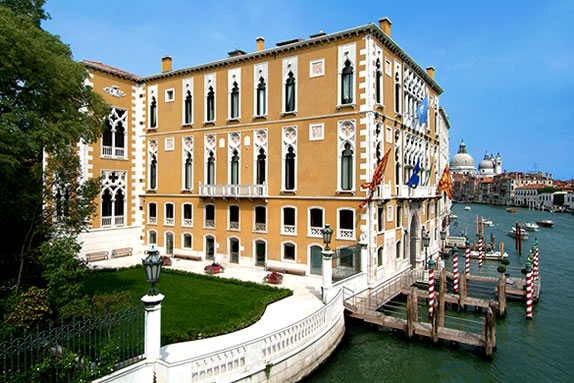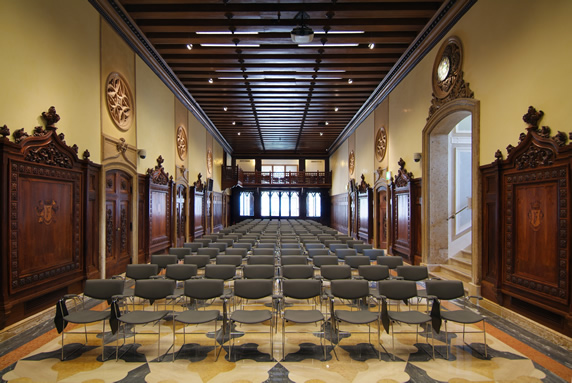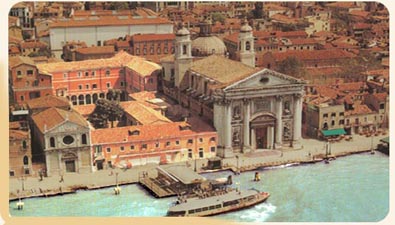|
|
Venice meeting on
Fluctuations in small complex
systems VI
Istituto Veneto di Scienze, Lettere ed Arti
Palazzo Franchetti, Venezia,
5th to 9th September 2022
LIST OF SPEAKERS.
Invited speakers
Elena Agliari, Sapienza Università di Roma, Assessing the
complexity and the minimal size in datasets for machine learning
Michael Assaf, Hebrew University, Jerusalem, Outbreak size distribution
in stochastic epidemic models
Marco Baiesi, Università di Padova, What does machine
learning understand about polymer topologies and sequences?
Fulvio Baldovin, Università di Padova, Brownian non-Gaussian
diffusion to target
Eli Barkai, Bar-Ilan University, Fractional
diffusion-advection-asymmetry equation
Clemens Bechinger, Universität Konstanz, Dynamics of colloidal
particles in non-Markovian systems
Jean-Philippe Bouchaud, École Normale Supérieure, Paris,
Liquidity Crises and Hawkes Processes
Elisabeth Bouchaud, CEA Paris-Saclay, Science on stage
Rajarshi Chakrabarti, Indian Institute of Technology Bombay, Mumbai,
Migration of active rings in porous media
Dmitri Chklovskii, New York University, Biological machine
learning
Douglas Durian, University of Pennsylvania, Philadelphia PA,
A brain-inspired electronic learning machine
Gianmaria Falasco, University of Luxembourg
Thomas Franosch, Universität Innsbruck, Gravitaxis of a
single active Brownian particle
Aljaz Godec, Max Planck Institute for Multidisciplinary Sciences, Göttingen, Time (ir)reversibility in the presence of memory
Luca Giuggioli, University of Bristol, Dynamics of constrained
lattice random walks
Denis Grebenkov, École Polytechnique, Palaiseau, Depletion of resources
by a population of diffusing species
Helmut Grubmüller, Max Planck Institute for Multidisciplinary Sciences,
Göttingen, Statistical mechanics of biomolecular solvation shells
from a simulation perspective
Doris Heinrich, TU Ilmenau, Intracellular Transport Phenomena and
Cell Migration in Complex Systems - Challenges for Life Sciences in the 21st
Century
Thorsten Hugel, Universität Freiburg, Fluctuations and
molecule-spanning dynamics in a single protein measured from nanoseconds
to days
Jae-Hyung Jeon, Pohang University of Science and Technology, Active
diffusion of self-propelled particles interacting with a polymer network
Diego Krapf, Colorado State University, Fort Collins, RNA dynamics
in the cytoplasm of mammalian cells
Benjamin Lindner, Humboldt Universität zu Berlin,
Fluctuation-dissipation theorems far from equilibrium - from
non-equilibrium physical systems to spiking neurons
Andrea Liu, University of Pennsylvania, Philadelphia PA, Understanding
protein allostery from ensembles
Satya Majumdar, Université Paris Sud, Optimal resetting
Brownian bridge
Henry Mattingly, Yale University/Simons Foundation, E. coli
chemotaxis is limited by information and fluctuations
Cristian Micheletti, SISSA, Trieste, Nonequilibrium thermodynamics of
DNA nanopore unzipping
Alexander Neimark, Rutgers University, Piscataway NJ, Mesocanonical
Ensemble as a Rational to Study Fluctuations and Phase Transformations in
Nanoconfined Fluids
Aleena Patel, Stanford University, Imaging enhancer-promoter bridging
in a folded chromatin polymer
Eszter Posfai, Princeton University, Uncovering the mechanisms of
cell fate decisions in the preimplantation mouse embryo using live imaging
Shlomi Reuveni, Tel Aviv University, Queues with service resetting
Heiko Rieger, Universität Saarbrücken, Search efficiency
of chemotactic random walkers
Felix Ritort, University of Barcelona, Variance sum rule for stochastic
uncertainty
Yael Roichman, Tel Aviv University, Active matter information
engines
Udo Seifert, Universität Stuttgart, Thermodynamic inference beyond
the thermodynamic uncertainty relation
Michael Shelley, New York University, Simulating the cytoskeleton
Stas Shvartsman, Princeton University, Large scale phosphorylation
dynamics of signaling systems
Ana-Suncana Smith, Universität Erlangen-Nürnberg
Igor Sokolov, Humboldt Universität zu Berlin,
Fluctuation-dissipation relations in random processes under resetting
Peter Sollich, Universität Göttingen, Capturing
fluctuations in small copy number reaction networks using self-consistent
memory
Attilio Stella, Università di Padova, Anomalous dynamical
scaling determines universal critical singularities
Holger Stark, Technische Universität Berlin, Harnessing
random active motion on the microscale to perform work
Sofia Talas, Università di Padova, At the beginnings of
physics teaching
Pascal Viot, Sorbonne Université, Paris, Brownian Gyrators:
a growing family of models and phenomena
Giovanni Volpe, University of Gothenburg, Label-free measurement
of biomolecules and their diffusion
Matthias Weiss, Universität Bayreuth, Transport and
self-organization in living fluids
Agnieszka Wyłomańska, Wrocław University of Science and
Technology, Fractional Brownian motion with random Hurst exponent
Anton Zilman, University of Toronto, Clogging-free transport through
the crowded nuclear pore complex
Emerging talents
Davide Bernardi, Istituto Italiano di Tecnologia, Ferrara, Run
with the Brownian hare, hunt with the deterministic hounds
Michele Caraglio, Universität Innsbruck, Active Brownian particle
in a harmonic well
Gorka Muñoz Gil, Universität Innsbruck, Learning
physics and optimal strategies with artificial agents
Borja Requena Pozo, ICFO Castelldefels, Unraveling heterogeneous
diffusion in single particle trajectories
Jakub Spiechowicz, University of Silesia, Katowice, Periodic
potential can enormously boost free particle transport induced by active
fluctuations
Alessio Squarcini, University of Innsbruck,
Several exact results on statistics of single-trajectory spectral densities
of stochastic processes beyond their mean values
Jakub Ślęzak, Wrocław University of Science &
Technology, Weak subdiffusion in systems with velocity scattering
Samudrajith Thapa, Tel Aviv University, Non equilibrium probability
currents in optically driven colloidal suspensions
Posters
Abolfazl Ahmadirahmat, Universität Innsbruck
Rick Bebon, Max Planck Institute for Multidisciplinary Sciences,
Göttingen, Bounding Uncertainty of Empirical First Passage Times
of Reversible Markov Processes
Marco Benedetti, Sapienza Università di Roma, Perceptron
Learning vs Hebbian Unlearning: approaching optimal retrieval in Hopfield-like
Neural Networks
Costantino Di Bello, Universität Potsdam
Apurba Biswas, Institute of Mathematical Sciences, Taramani, Chennai,
India, Anomalous relaxation phenomena in stochastic systems
Kristian Blom, Max Planck Institute for Multidisciplinary Sciences, Göttingen, Tuning the Kinetics of Magnetization
Reversal in an Irreversible Ising Model
Anna Braghetto, Università di Padova, Knot classification
in polymers through deep learning
Marcus Dahlenburg, Universität Potsdam and BCAM, Bilbao
Cai Dieball, Max Planck Institute for Multidisciplinary Sciences,
Göttingen, Necessity for Coarse Graining Empirical Densities
and Currents in Continuous Space
Timo Dörries, Universität Potsdam, Mobile/immobile models
with long exponential waiting times for biological applications
Xavier Durang, Pohang University of Science and Technology,
Accessing power-law statistics under experimental constraints
Jacopo Fadanni, Università di Bologna, Singular Spectrum
Analysis as a signal decomposition tool
Koushik Goswami, Universität Potsdam
Sungmin Joo, Pohang University of Science and Technology,
Active diffusion governed by nonequilibrium generalized Langevin equations
Harpreet Kaur, Universität Innsbruck
Sumanta Kundu, Università di Padova, Machine learning
predictions of complex polymer topologies
Ofek Lauber, Tel Aviv University, The SOKOBAN random walk
Yingjie Liang, Universität Potsdam, Anomalous diffusion,
non-Gaussianity, nonergodicity, and aging for subordinated fractional
Brownian motion with drift
Conrad Moeckel, Max Planck Institute for the Science of Light,
Erlangen
Yuval Scher, Tel Aviv University, Unified approach to gated reactions
on networks
Henrik Seckler, Universität Potsdam, Bayesian deep learning
for error estimation in the analysis of anomalous diffusion
Marco Tuccio, Università di Torino
Ron Vatash, Tel Aviv University, Many-body stochastic resetting
with holographic optical tweezers
Wei Wang, Universität Potsdam
Qing Wei, Universität Potsdam, Fractional anomalous
diffusion and Non-Darcian flow in geological system
Participants
Aleksei Chechkin, Universität Potsdam
Zahra Ahmadian Dehaghani, SISSA, Trieste
Joseph Klafter, Tel Aviv University
Janik Schüttler, University of Cambridge UK
Gianluca Teza, Weizmann Institute of Science, Rehovot, Israel
|
|


